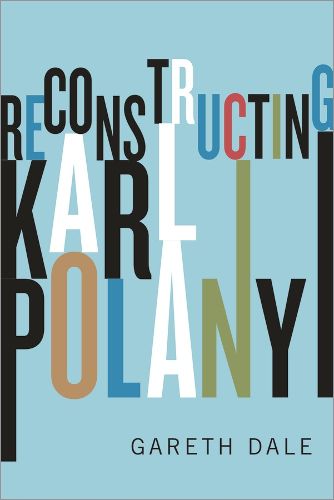Readings Newsletter
Become a Readings Member to make your shopping experience even easier.
Sign in or sign up for free!
You’re not far away from qualifying for FREE standard shipping within Australia
You’ve qualified for FREE standard shipping within Australia
The cart is loading…






*Shortlisted for the Deutscher Memorial Prize 2017*
Karl Polanyi’s contribution to political economy and social science is immeasurable. In Reconstructing Karl Polanyi, Gareth Dale, foremost scholar and biographer of Polanyi, provides a sweeping survey of his contributions to the social sciences.
An opponent of traditional economics and a believer in economics’ contingency to society and culture, Polanyi’s work has a cross-disciplinary appeal, finding popularity in anthropology, economic history, economic sociology and political science. Paradoxical formulations, such as ‘liberal socialist’ and ‘cosmopolitan patriot’, are often used to describe Polanyi’s intellectual and political vision. In exploring these paradoxes, Dale draws upon original writings and transcripts to reconstruct Polanyi’s views on a range of topics long neglected in critical literature; including the history of antiquity, the evolution and dynamics of Stalin’s Russia, McCarthyism and Polanyi’s critical dialogue with Marxism.
Accompanying the reconstruction of his work is Dale’s analysis of Polanyi’s relevance to current issues, notably the ‘clash’ between democracy and capitalism, and the nature and trajectory of European unification. This proves an indispensable critical guide to Polanyian thought.
$9.00 standard shipping within Australia
FREE standard shipping within Australia for orders over $100.00
Express & International shipping calculated at checkout
*Shortlisted for the Deutscher Memorial Prize 2017*
Karl Polanyi’s contribution to political economy and social science is immeasurable. In Reconstructing Karl Polanyi, Gareth Dale, foremost scholar and biographer of Polanyi, provides a sweeping survey of his contributions to the social sciences.
An opponent of traditional economics and a believer in economics’ contingency to society and culture, Polanyi’s work has a cross-disciplinary appeal, finding popularity in anthropology, economic history, economic sociology and political science. Paradoxical formulations, such as ‘liberal socialist’ and ‘cosmopolitan patriot’, are often used to describe Polanyi’s intellectual and political vision. In exploring these paradoxes, Dale draws upon original writings and transcripts to reconstruct Polanyi’s views on a range of topics long neglected in critical literature; including the history of antiquity, the evolution and dynamics of Stalin’s Russia, McCarthyism and Polanyi’s critical dialogue with Marxism.
Accompanying the reconstruction of his work is Dale’s analysis of Polanyi’s relevance to current issues, notably the ‘clash’ between democracy and capitalism, and the nature and trajectory of European unification. This proves an indispensable critical guide to Polanyian thought.